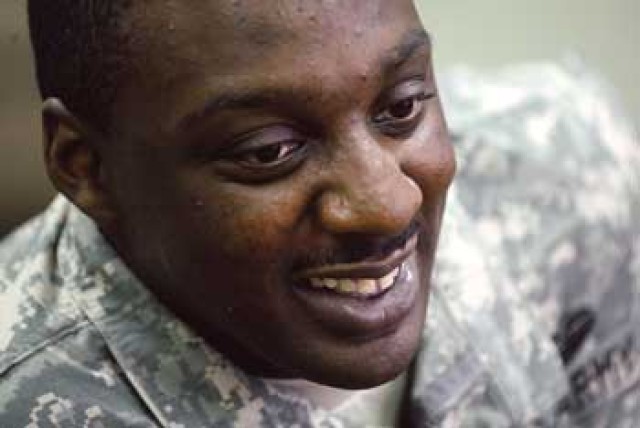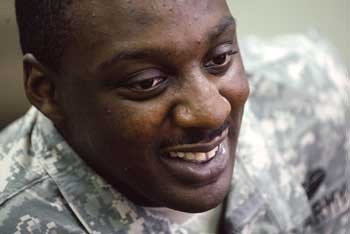FORT HUACHUCA - On the mean streets of Baghdad, Staff Sgt. Amin Jones was glad the day's mission was just about over.
He was returning to a combat outpost in one of the meaner areas of the Iraqi capital - Sadr City, a stronghold of an anti-American Shi'a cleric.
Deployed with the 1st Battalion of the 128th Infantry Regiment, the Black Lions, of the 1st Infantry Division out of Fort Riley, Kan., it wasn't the first time Jones had been sent into harm's way during America's war on terrorism.
Now, the vehicle he was in with his gunner, Sgt. Curtis Glawson, came closer to the meanest part of Sadr City, which they called home.
And then there was a tremendous explosion. A large-scale improvised explosive device nearly turned the heavily armored maintenance-recovery vehicle over.
The explosion threw Jones out of the vehicle, causing massive wounds mostly to his upper body and his hands. He suffered fractures, broken ribs and crushing injuries.
And, the 26-year-old soldier said, "I had a traumatic brain injury after being blown out of the truck."
TBI, as it is called, has become a signature wound during combat operations in Iraq and Afghanistan, when the head is rocked back in forth and even a helmet provides little protection.
While Jones was wounded, Glawson was killed instantly by the blast.
The soldier was Jones' friend and slept in the cot next to his.
"I've cried for him for months," Jones added, as he looked down and swallowed hard in an attempt to check his emotions.
Even though it has been nearly two years since that day, Jones said he hasn't been able to bring himself to talk with Glawson's family.
"I'll do it some day. I have to," he said.
Like many who are wounded on a battlefield and lose a friend in the same incident, Jones said it has been difficult for him to understand how the fates of that day decided who lived and died.
"The hardest part for me is, why did I survive'" he said.
The horror of that day still is with Jones. It's repeated in his dreams and when he is awake.
The eight-year Army veteran from Kittrell, N.C., also suffers from Post Traumatic Stress Disorder.
There isn't just one thing that will trigger a PTSD episode.
"It's a sound, a smell or something that takes me back there," Jones said.
What he remembers about that March 2007 day and its immediate aftermath are like little pieces of a puzzle he is putting together.
He remembers somehow exiting the truck.
He was eventually able to stand and stagger off until fellow soldiers helped get him away from the blast scene.
How long he was out and how long it took to be treated remains a blank.
Jones said he doesn't know if he will find all the pieces to that day's puzzle.
What he remembers of his initial medical treatment is something that comes and goes. He was immediately air-evacuated out of Iraq, going first to Germany and then on to the states.
He ended up at a VA facility in Raleigh, N.C., where he could be close to his family. Jones said that was an important part of his recovery.
Saying his dad is "a quiet soft-spoken man," Jones said his father gave him the knowledge he would survive and be productive member of society.
His mom gave him what only a mother does - the touches and kisses that helps one heal within.
Jones' wife, Marie, was his strongest foundation. She, too, has lived though his nightmares. She provided all the support she can in helping him cope.
In the aftermath of his head injury, he has had excruciating migraines. He still has an occasional bout, but not as bad as before. His PTSD episodes are not as numerous, too.
After some time in Raleigh, Jones was returned to Fort Riley, where he was part of that post's Warrior Transition Unit, which had nearly 500 soldiers.
As he improved and was ready to return to some semblance of regular Army life, Jones and his wife and two children, Zeyla, 3, and Amin Jr., 2, came to Fort Huachuca on Sept. 5, about 18 months after being wounded in Iraq.
The Army sends recovering soldiers who are going to remain in the service to a fort where the potential for deployment is not as great, he said.
An ordnance soldier, Jones was initially assigned to a garrison job. When an opening in the Arizona post's WTU came about, he asked to be assigned to it as a platoon sergeant.
"I wanted to help soldiers going through the same things heal," Jones said.
He said a person who has gone though WTU and trying to return to normalcy can offer more.
Sitting around feeling sorry for oneself is not good, Jones said.
He sees his job, as a platoon sergeant over eight soldiers, as helping them prepare to return to the Army or be ready for when they leave the service.
And, yes, that sometimes requires ensuring those in his platoon do not stop being soldiers.
Being a disciplined soldier is an important part of the healing process, Jones said, noting it also allows individuals to reach out and help each other.
In the Army, there is a concept of battle buddies, as he and Glawson were. That concept is part of healing, too.
As for his future, Jones said that when his two years at Fort Huachuca are over, he would like to go on to become an instructor at the Aberdeen Proving Ground in Maryland. After a couple of years in that job, he would like to become a warrant officer. He has a bachelor's degree from the University of Maryland.
For now, he still is healing. Part of that is helping other soldiers. And part of his strength comes from Marie, who works on post, and his two children.
Having time with the family brings a sense of reality to his world, especially with his children, Jones said.
He spends time with his son and daughter.
"We play house, we have tea parties," the soldier said of time with his daughter, a wide-smile on his face.
The soldiers in his WTU platoon should not take that as any lessening of his military persona.
"My family is important to me," he said, adding that recognition was strengthened in the role they are playing in his healing process.
And soldiers are another part of his family.
"I love soldiers, too," Jones said.


Social Sharing